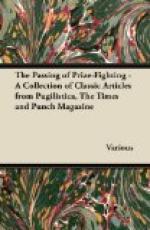... Not the least interesting and delicate of my duties as a confidential adviser were connected with a work of reminiscences which created some stir in the nineteen-twenties. How it came about I cannot recollect, but it was thought that my poor assistance as a friendly censor of a too florid exuberance in candour might not be of disservice to the book, and I accepted the invitation. The volume being by no means yet relegated to oblivion’s dusty shelves I am naturally reluctant to refer to it with such particularity as might enable my argus-eyed reader to identify it and my own unworthy share therein, and therefore in the following dialogue, typical of many between the author and myself, I disguise her name under an initial. Quis custodiet? It would be grotesque indeed if one whose special mission was to correct the high spirits of others should himself fail in good taste.
Mrs. A. (laying down the MS. with a bang). I see nothing but blue pencil marks, and blue was never my colour. Why are you so anxious that I should be discreet? Indiscretion is the better part of authorship.
EDMUND (earnestly). It is your fame of which I am thinking. If you adopt my emendations you will go down to history as the writer of the best book of reminiscences in English.
Mrs. A. (with fervour). I don’t want to go down to history. I want to stay here and make it. And you (with emotion)—you have cramped my style. I can’t think why I asked you to help.
EDMUND. Everyone asks me to help. It is my destiny. I am the Muses’ amicus curiae.
Mrs. A. Oh, blow Latin! (Lighting two cigarettes at once) What’s the good of reminiscences of to-day, by me, without anything about L.G.?
EDMUND. Dear lady, it would never have done. Be reasonable. There are occasions when reticence is imperative.
Mrs. A. Reticence! What words you use!
(Caetera desunt.)
II.
FROM “A WEEK IN LOVELY LUCERNE.”
By D. Lloyd George.
... I do not say that the mountains hereabout are not more considerable than those of our own beloved Wales, but as material to be employed in perorations they are far inferior. There is not the requisite mist (which may symbolise ignorance or obstinacy or any temporary disturbance or opposition), later to be dispelled by the strong beams of the sun (representing either progress generally or prime-ministerial genius or pure Coalitionism). Other local features I felt, however, I might find rhetorically useful, such as THORWALDSEN’S Lion, so noble, so—so leonine, but doomed ever to adhere to the rock, how symbolic of a strong idealist unable to translate his ameliorative plans into action! The old bridge too, uniting the two sides of the city, as one can attempt to link Radicalism and Coalitionism—how long could it endure? And so on. One’s brain was never idle.




